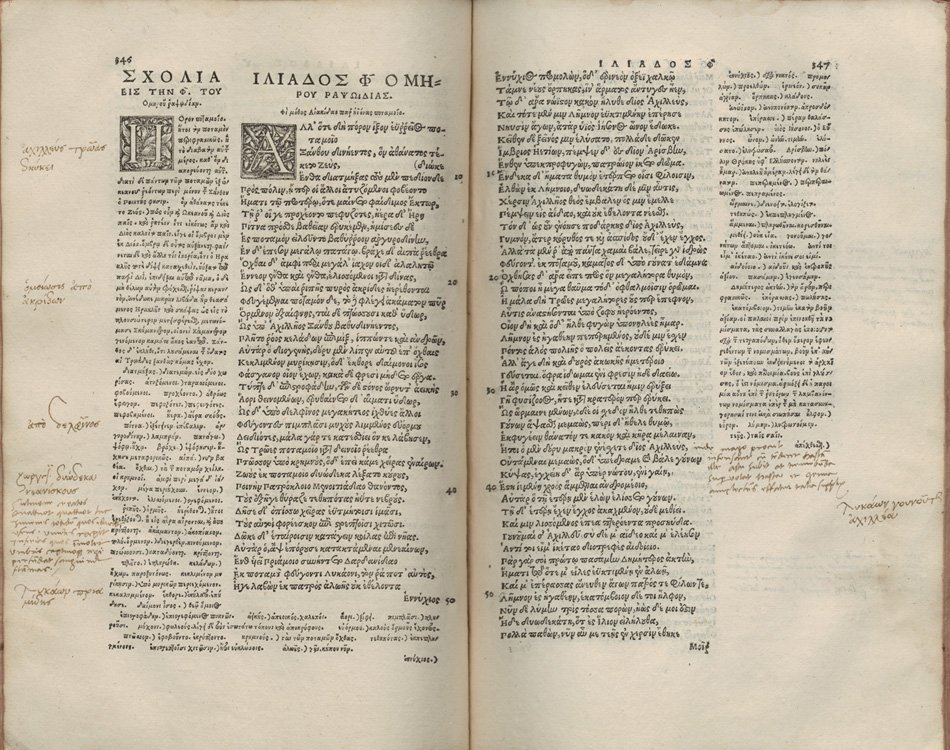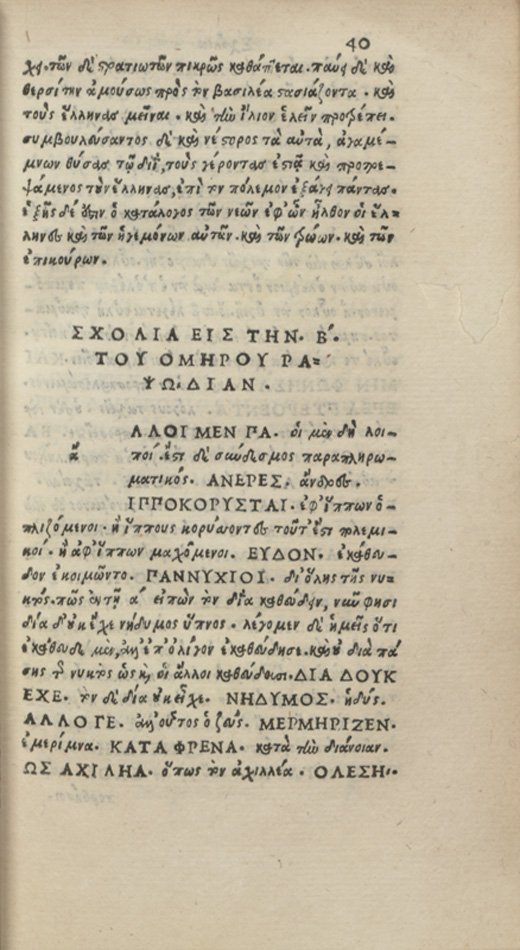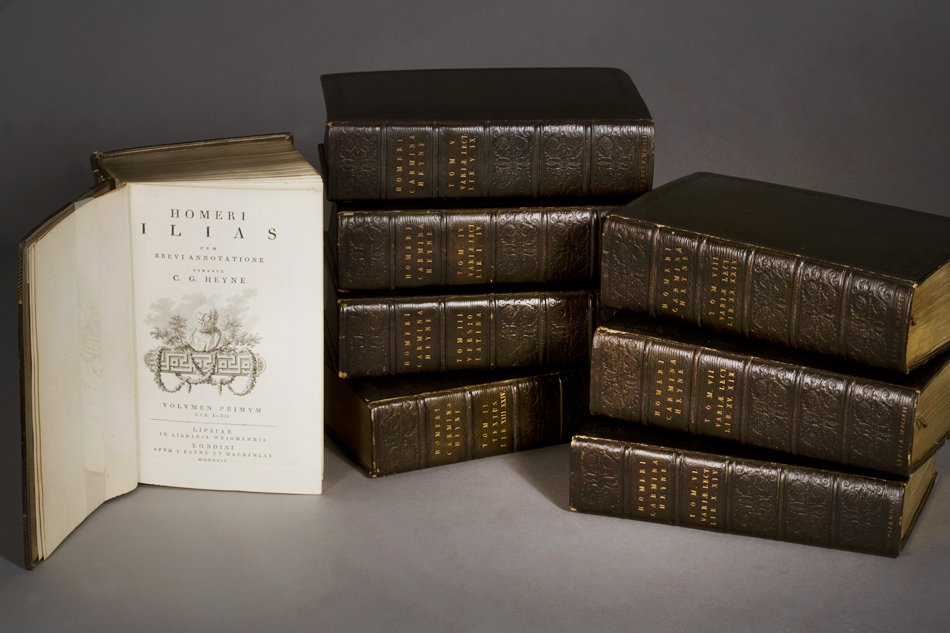Homeric Scholarship
Efforts to determine the origins of the Homeric epics, produce an authoritative text, and provide explanatory notes for readers began in antiquity. Ancient scholars commented on the Homeric poems in the form of "scholia" that circulated at first within the margins of the text and later as separately published compilations. Scholia covered a wide range of topics, including alternate readings, the meaning of obscure words and unfamiliar grammatical forms, and critical explanation or interpretation of the texts. Scholia written in medieval and Byzantine manuscripts often mix notes from antiquity with those from later eras, making the work of identifying and dating scholia highly complex.
Firsthand knowledge of the Iliad and Odyssey declined in the Middle Ages along with competence in ancient Greek. Latin translations by Italian Renaissance humanists began to make the works accessible in the West by the early sixteenth century, and scholarship again flourished as translations into modern languages appeared. In the eighteenth century, editors turned their attention to the manuscripts in an effort to attempt to establish a single authoritative text. These erudite editions, with extensive critical notes and interpretation, also evaluated and compiled previous manuscript evidence and scholarship.
One of the most enduring issues in Homeric scholarship has been the "Homeric Question," which focuses on when and how the epics were produced and whether they are the work of one or many poets. Several scholars including Friedrich August Wolf argued that the poems had passed through several centuries of oral transmission before they were written down and edited, identifying repetitions in the text as critical to improvisation. Critics who endorsed Wolf's theory of multiple authorship came to be known as the "Analysts," in contrast to "Unitarians" who argued in favor of the aesthetic unity of the poems. Despite the apparent divide, most Analysts believed in one unifying figure who collected individual poems into their current state, and Unitarians acknowledged that the poems as we know them include accretions and compilations by others.
In the early decades of the twentieth century, research methodologies from developing social sciences disciplines such as anthropology and ethno-linguistics entered Homeric scholarship. Milman Parry's "oral-formulaic" theory has had a profound influence on Homeric scholarship and encouraged a number of twentieth- and twenty-first century translations that emphasize the improvisational and performative elements of the Iliad and the Odyssey.
'Oμήρου 'Iλιὰς καὶ Όδύσσεια μετὰ τῆς ἐξηγήσιος = Homeri Ilias et Vlyssea. . . .
Basel: Apud Io. Hervagium, 1535.
This is the first printed edition to present the scholia alongside the texts of the poems. Herwagen relied on the editions of the scholia printed by the Aldine Press (BHL D1, also on view in this section).
BHL A8
Scholia palaia te, kai panu ōphelima eis tēn tou Omērou Iliada, kai eis tēn Odyssea / Interpretationes et Antiquae, et perquam Utiles in Homeri Iliada, nec non in Odyssea
Venice: In aedibus Aldi, et Andreae soceri, 1521.
The scholia in this volume include vocabulary glosses, explanations, and paraphrases, many of which can be traced back to antiquity. Now known as the "D Scholia" and not believed to have any connection with Alexandrian scholar Didymus, they were written in the margins of medieval manuscripts of the Homeric texts. Although the title of this 1521 edition refers to both Homeric epics, the Aldine Press did not issue the companion volume containing the scholia to the Odyssey until 1528. Both were edited by Franciscus Asulanus, Aldus Manutius's brother-in-law.
BHL D1
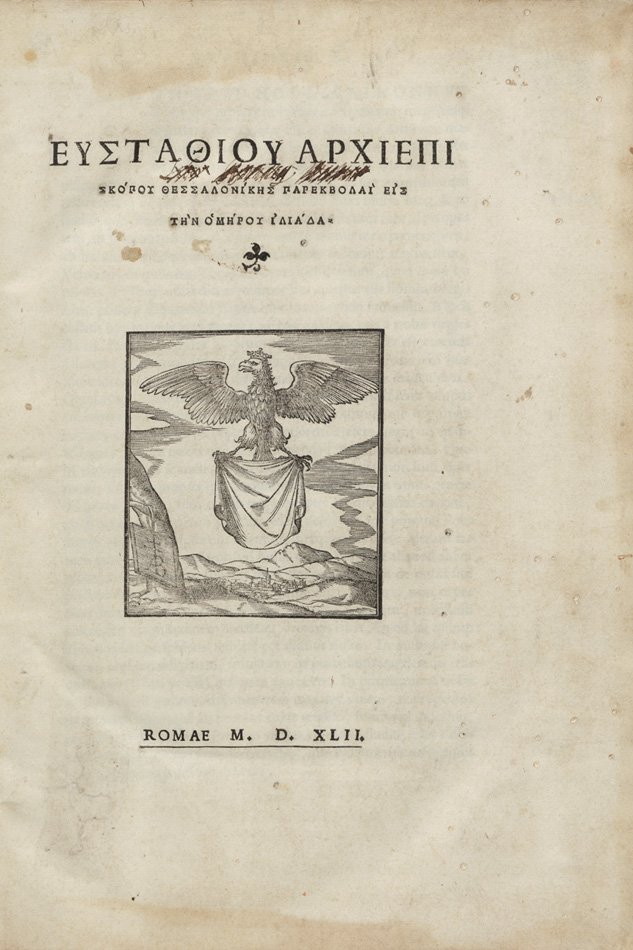
Eustathiou Archiepiskopou Thessalonikes Parekbolai eis ten Homerou Iliada kai Odysseian meta Euporotatou kai panu Ophelimou Pinakos
Rome: [Apud Antonium Bladum Impressorem Cameralem], 1542–50.
The commentaries of Eustathius, compiled from manuscripts dating back to the twelfth century, refer to and quote from ancient manuscripts that existed during his time but had been lost by the beginning of the Renaissance. Published alongsidethe Homeric texts in four volumes, the massive project was immensely important and of long-lasting influence.
BHL D4
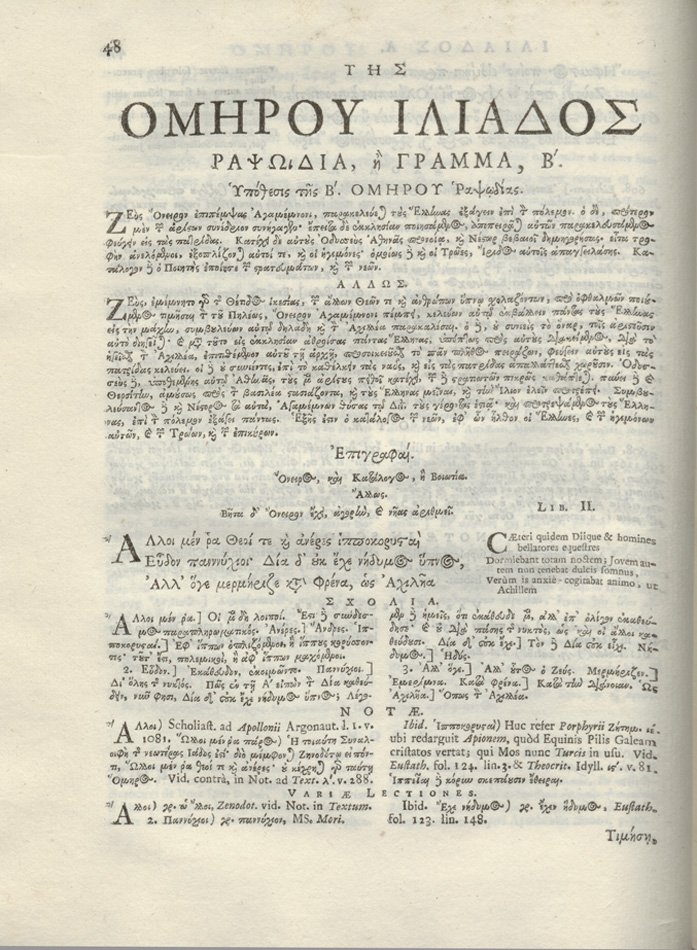
'Oμήρου 'Iλιὰς καὶ Όδύσσεια, καὶ εἰς αὐτὰς σχόλια, ῍η ἐξήγησις τῶν παλαιῶν = Homeri Ilias & Odyssea.. . .
London: Oxford University Press, Geoffrey Cumberlege, 1711.
In his preface Cambridge classicist Barnes compliments himself on the correctness and completeness of his edition, which he considers superior to all earlier ones. Whatever the truth of his claim, Barnes takes pains to point out where he diverges from previous editions, reassuring readers that he has made no changes without noting them.
BHL A18
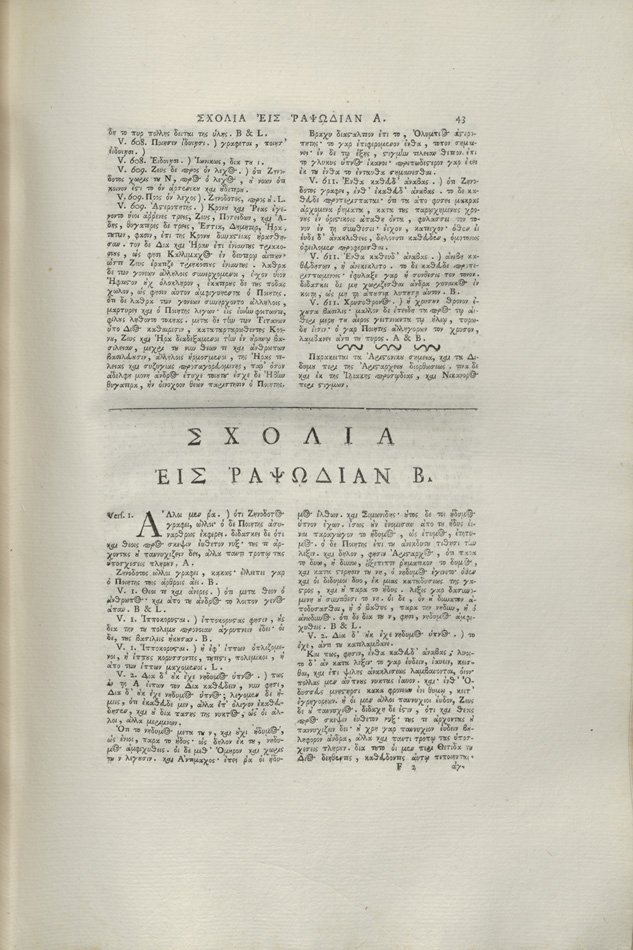
'Oμήρου'Iλιὰς σὺν τοῖς σχολίοις = Homeri Ilias. . . .
Venice: Typis et sumptibus Fratrum Coleti, 1788.
French classical scholar Jean Baptiste Gaspard d'Ansse de Villoison brought to light the long-neglected Venetian scholia on Homer contained in the tenth-century Venetus A manuscript (see the section in this exhibition, "Homer before Print"). These scholia provided crucial evidence about the activity of ancient scholars and their influence on the transmission of the Homeric texts. With their publication, scholars intensified their effort to restore the poems to their state prior to the ancient critics' interventions.
BHL A21
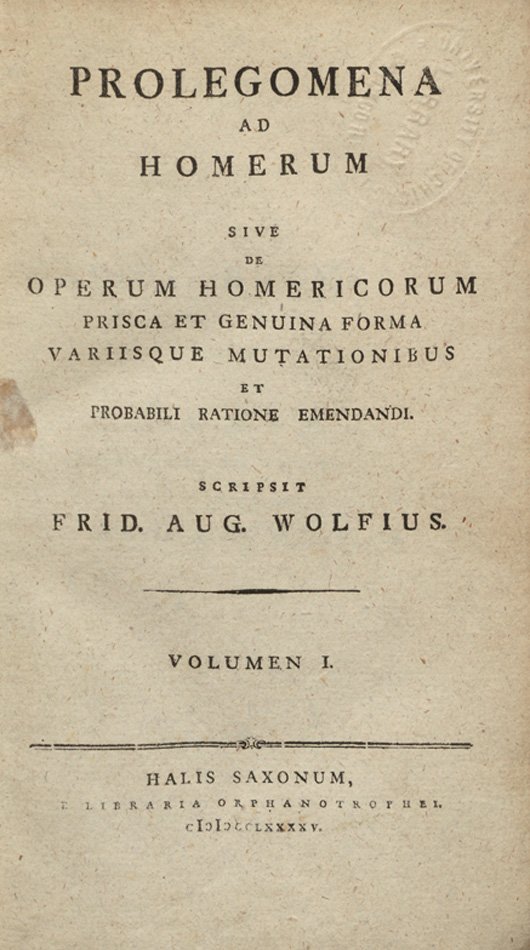
Prolegomena ad Homerum....
Halle an der Saale: Libraria Orphanotrophei, 1795.
Rare Book Collection.
Wolf studied with Christian Gottlob Heyne at the University of Göttingen and adopted his teacher's historical and comparative approach to classical studies. In the Prolegomena, which has been called the first "history of a text in antiquity," Wolf marshalled critical evidence to support views of Homer as a primitive oral bard that fueled the great debate on the "Homeric Question."
Homeri Ilias. . . .
Leipzig: In libraria Weidmannia and London: Apud I. Payne et MacKinlay, 1802.
This massive edition of the Iliad, consisting of eight large volumes, collected and synthesized nearly all the scholarship that preceded it and provided the most comprehensive reporting of manuscript evidence to date.
BHL A23
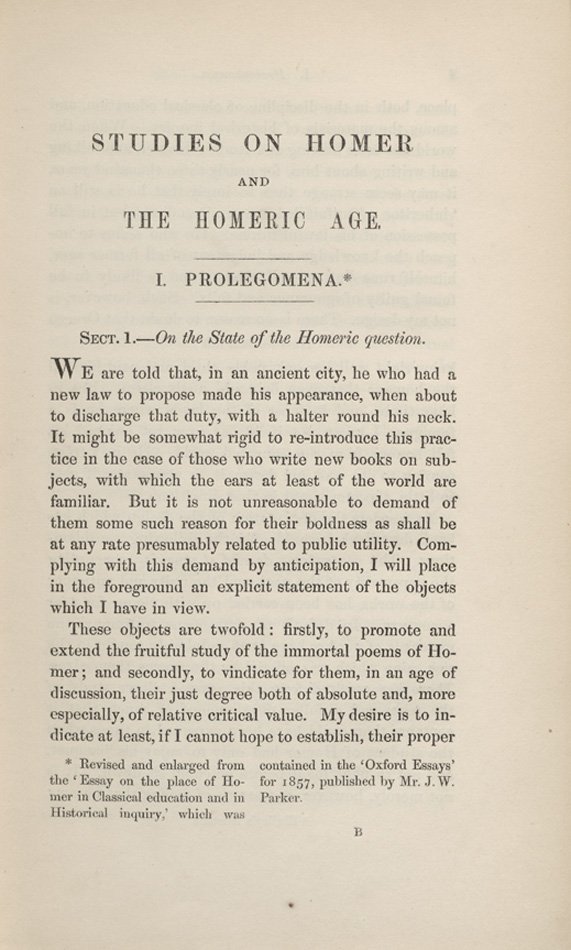
Studies on Homer and the Homeric Age
Oxford: At the University Press, 1858.
Four-time Prime Minister and renowned orator William Ewart Gladstone composed this three-volume historical study of the Homeric works while he was out of political office.
BHL D11
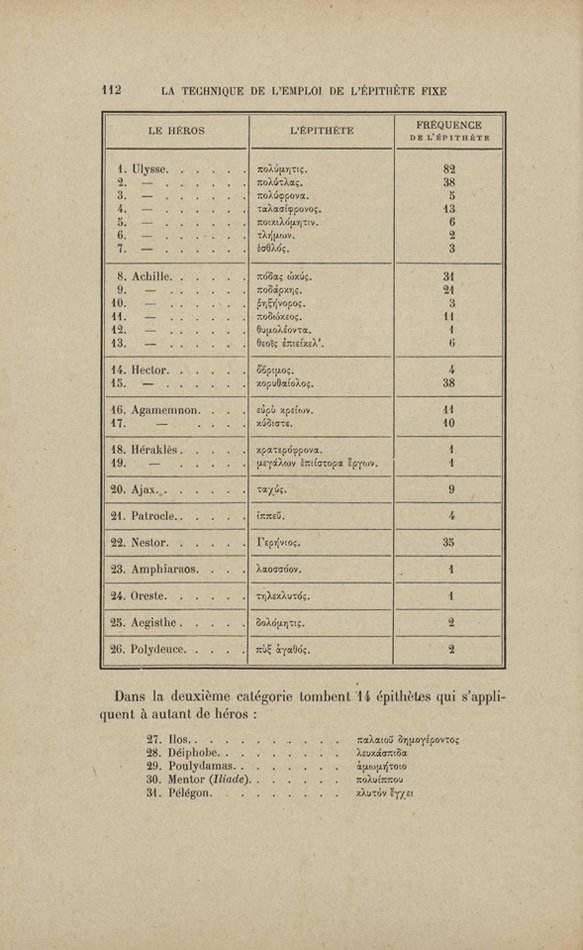
L'Épithète Traditionnelle dans Homère: Essai sur un Problème de Style Homérique
Paris: Société d'Éditions "Les Belles Lettres," 1928.
In this doctoral thesis, Milman Parry examines the formulaic features of the epics – the repetitions of stock nouns, adjectives, and phrases – in relation to their oral composition. He later traveled to Yugoslavia to study and compare the living oral tradition of the guslars, popular singers who performed traditional music and heroic poetry. After Parry's untimely death, his student and assistant Albert Bates Lord continued his research. Bates and Parry are generally regarded as the founders of modern oral-formulaic theory, since applied by anthropologists and linguists to many oral traditions.
BHL D14
